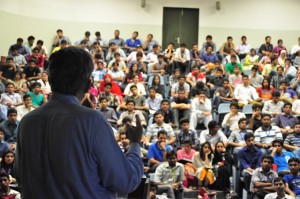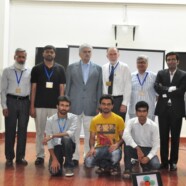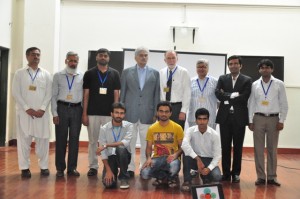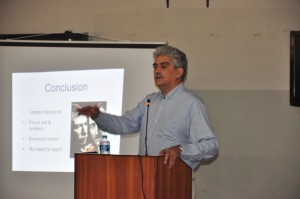Dr Nadeem ul Haq speaks on Pakistan’s low economic growth
On 29 April, 2013, the Department of History and the Lucas Economic Society arranged a lecture by Dr Nadeem ul Haq, Deputy Chairman and Minister, Planning Commission of Pakistan on ‘Why is there low economic growth in Pakistan?’
Dr Nadeem ul Haq started his lecture by asking a very straightforward question as to whether Pakistan can develop? His assertion was that ‘Pakistan cannot develop.’ He said that there is no demand for growth in Pakistan for not only is there no research in academia or interest in the media on economic issues. Dr Haq categorically stated that ‘academia is the agent of change in a country, but it does not do its work at all.’ Further, taking the example of editorials in The News and Dawn on economics in the month of January 2013, Dr Haq showed that only once was the IMF mentioned in these editorials, and that too within the context of asking more money. Mostly the editorials were oblivious of economic issues, exhibiting the lack of interest in development issues.
 He then went on to frankly touch other important issues, which continue to hinder the country’s economic progress. ‘Everyone talks as if he is an expert in economics,’ said Dr Nadeem ul Haq. He called for disbanding the Planning Commission, for it is doing nothing and lacks professionalism and cutting-edge research. He said that we are mired in a patronage culture which discourages research and questioning, and focuses on only developing projects with donor money.
He then went on to frankly touch other important issues, which continue to hinder the country’s economic progress. ‘Everyone talks as if he is an expert in economics,’ said Dr Nadeem ul Haq. He called for disbanding the Planning Commission, for it is doing nothing and lacks professionalism and cutting-edge research. He said that we are mired in a patronage culture which discourages research and questioning, and focuses on only developing projects with donor money.
Dr Haq then gave some propositions as the main part of his lecture. The first proposition argued that ‘We are very comfortable; No constituency for growth in Pakistan.’ This he said was self evident as there is no conversation, academic or policy, on growth in Pakistan. The second proposition was that ‘We need to think differently; traditional economics as practiced in Pakistan will not work.’ Dr Haq emphasized that unless we break the old mode of thinking, mainly 1950’s thinking, we cannot develop. He took the example of Europe, which after millennia of economic stagnation emerged as the world’s economic powerhouse beginning in the 1800’s.
He argued that this was because Europe followed the liberal democratic model predicated in merit, competition, knowledge and scientific method, discipline, competition and consumer culture. Unless such drastic changes come in Pakistan, the country will not grow. The third proposition argued for the ‘software’ of growth—i.e., institutions. Without strong institutions which further growth, Pakistan does not have much of a chance, Dr Haq argued. Proposition four argued that the state should be rolled back and rent seeking controlled. Extractive and predatory rent seeking is extremely harmful for the development of the economy, he argued. In order to move forward, therefore, Dr Haq argued in proposition five and six, that Pakistan needs to institute radical bureaucratic reforms, deregulation, and urban planning. Without such changes there is no prospect of development.
Dr Haq ended by quoting Keynes and said ‘Ideas shape the course of history,’ bringing the ball back to the court of academia and research. Unless academia shapes the research agenda, Pakistan real and lasting economic growth will bypass Pakistan.
Dr James Tebbe, the Rector, thanked Dr Nadeem ul Haq for his very forthright and precise talk. He agreed that academia is certainly at the center of any development initiative and hoped that Forman Christian College will continue to help in this endeavor.









Good morning,
I hope you will be doing good. I need power point presentation or materiel regarding presentation of Dr. Nadeem ul Haque on the topic of low economic growth. I will be very thankful to you for this.
Regards,
Abid Rehman.
Reseach scholar at PIDE.